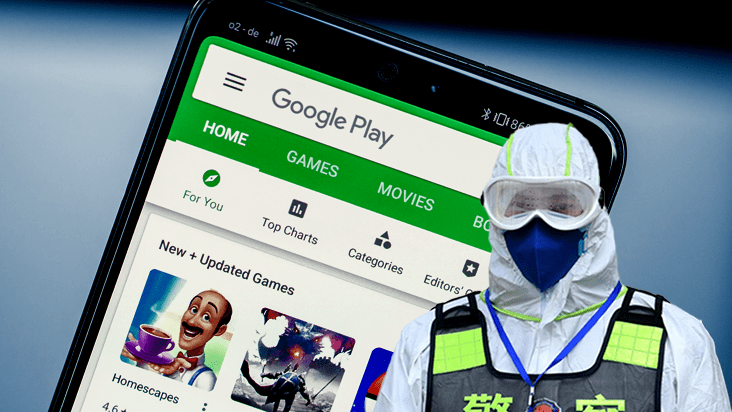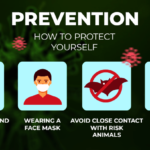The world is battling a new coronavirus outbreak. Officials, doctors and scientists are trying to contain the coronavirus. The massive outbreak has affected 90 countries and territories as of Friday. It is rapidly changing the everyday lives and has affected more than 98 000 people. Most of them are from China as the outbreak started in the city of Wuhan, China.
Misinformation about coronavirus is spreading faster than the virus itself. Health organizations are putting a lot of efforts to deliver the right information about the new virus. However, it is not easy, as the misinformation is spreading like a wildfire.
While the tech giants, like Google, are working alongside with the reputable health organizations to reduce the misinformation and provide news from the trusted sources, China has taken another road. As reported, most popular Chinese apps like WeChat has been banning topics about coronavirus. Censorship started in January 2019 When the coronavirus outbreak took a massive turn.
Chinese apps censoring Coronavirus content
China is known for its censorship. It controls which websites citizens use and what they are posting on social media. Websites like Wikipedia and Google are not available in the country. It is also very common for Chinese social media apps to remove certain content and block keywords. It happens when the things people post are considered to be a threat to the social stability of the country or the power of the government
Just this week, the news came out that the most popular Chinese messaging app WeChat was censoring keywords related to coronavirus since January. Toronto-based research group Citizen Lab was the first one to report this news. The group found out that WeChat has started blocking certain words from as early as first January. It was after the Chinese government first altered the World Health Organization (WHO) about the new virus outbreak.
However, the report suggests that WeChat has been banning discussions about the new virus even before. The Chinese government was withholding information about the outbreak from its citizens until the outbreak got severe.
WeChat blocking Coronavirus keywords
WeChat started blacklisting coronavirus related keywords from the first January. First, it blocked several keywords, but the list of them grew, as the outbreak became more and more massive. Based on the report, WeChat has blocked up to 500 keywords from first January to 15 February. It made it almost impossible for Chinese citizens to exchange information about coronavirus and stay updated.
One cannot say for sure if WeChat started banning coronavirus related keywords after the government’s direct order, or if it was their initiative to avoid the dissatisfaction of the government members. However, on 5th February, the internet governance agency, the Cyberspace Administration of China (CAC) got involved in censorship.
They issued a public statement that listed several Chinese companies such as ByteDance, Sina, and Tencent. ByteDance owns social media app Douyin/TikTok, while Sina owns Weibo and Tencent owns WeChat. According to the statement, the agency would punish those platforms, websites, and accounts that spread feat related to coronavirus by publishing harmful content.
On the same day, many internet users in China started posting on Weibo, which is a microblogging website in China, similar to Twitter. Many users complained that their WeChat accounts were suspended without explanation temporary or permanently. While some of them stated that they got banned for spreading malicious rumours. Complainers were using “WeChat bans accounts” hashtags. Shortly after the Weibo page disappeared too.
Censoring coronavirus topics and suspending WeChat accounts is a very big deal in China since the WeChat is the most popular social media and messaging app in the country. It is China’s Facebook, Apple pay, and WhatsApp combines into one app. Users can also make payments and book flights with It.
YY censoring coronavirus topics
WeChat is not the only website that has been censoring coronavirus topics. As the same report states, so did the live-streaming website YY. The group of researchers found that YY started blocking keywords from 31 December. They have identified up to 45 keywords that were blocked on 31 December. According to BBC Keywords were related to the yet unidentified virus and included terms like “SARS outbreak in Wuhan” and “Unknown Wuhan pneumonia.” YY has later unblocked certain keywords, but it is unknown which keywords remain blocked still if any.
Tech Giants fighting misinformation
While China is doing its best to contain coronavirus it also tries hard to control what citizens are talking about it. The Chinese propaganda machine is working at its full speed to maintain control over its citizens in this time of crisis. Meanwhile, tech giants are also working hard to restrain the spread of misinformation and provide news, updates and safety tips from trusted resources.
Google launching SOS alert alongside with WHO
Google has teamed up with the World Health Organization (WHO) to make necessary information easily accessible for internet users. It launched SOS alert so people can find information and learn more information about the outbreak.
When internet users google to search for ‘coronavirus’ or ‘covid-19’ and other related terms they find relevant information from trusted resources on the first page. When googling coronavirus you can see WHO, CDC, ECDC and WHO Twitter account on the top results.
Google Play hides coronavirus app from Google Play search results
This week Google hid all coronavirus apps and games from the search results of Google play. Until this week users could find tens of various games, maps, trackers and other coronavirus related apps when searching for the keywords like ‘coronavirus’ or ‘covid-19.’ Now when doing the same, there are no results. However, these apps can still be found on the app store when searching for the same keywords but misspelling them. For example, you can still find coronavirus apps when searching for ‘covid-19’ without dash ‘covid19.’ Also, when searching for ‘coronavrus’ or ‘cronavirus’ and other variations.
Google has not made any comments regarding hiding coronavirus apps from the Google Play search. It may be another step forward for fighting misinformation. Since many such apps and games spread unverified information.
Facebook Blocking misleading ads about coronavirus
Facebook is also taking part in the fight with the misinformation. At first, the company announced that it will remove misleading information about coronavirus from both of its platforms: Facebook and Instagram. Later on, Facebook also confirmed with the Business Insider that it will ban coronavirus ads that mislead users. Companies, media platforms or other pages are no longer able to advertise coronavirus ads that promise to prevent or cure coronavirus. The ads that create a sense of urgency, or advertise the limited supply of items like face masks will be banned as well. This way Facebook is trying to prevent spreading of misleading information and creating even bigger panic and fear.
Facebook offering free ads to WHO
Similarly, to Google, Facebook is also working alongside the WHO, helping it deliver correct, verified information about coronavirus. When you search for ‘coronavirus’ or ‘covid-19’ in Facebook search, the first thing in results is the pop-up redirecting to the official page of the World Health Organization.
Apart from it, Facebook offers the World Health Organization as many free ad spaces in response to Covid-19 as they need. It also offers ad credits to other health organization.
With the internet taking such a huge role in our everyday life, it is promising to see that tech giant such as Google and Facebook are working alongside with the health organizations to provide verified information, safety tips and updates about coronavirus. Hopefully, campaigns like this will help reduce panic and educate people about the coronavirus.



